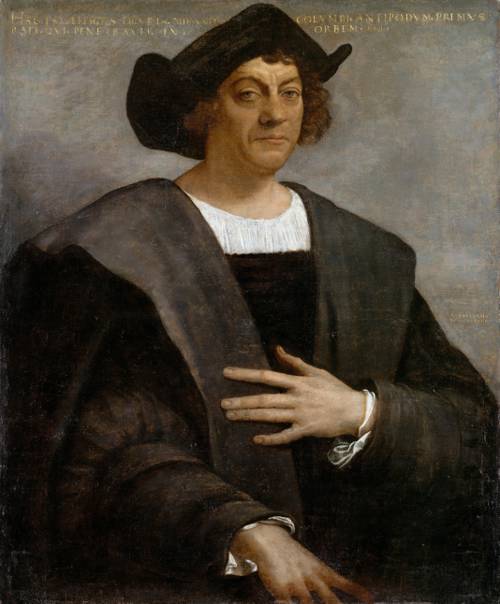
FAQ About Christopher Columbus

What were Christopher Columbus's main objectives in his 1492 voyage?
Christopher Columbus set out in 1492 with the primary objective of finding a westward sea passage to the lucrative markets of Asia, particularly India and China. Sponsored by the Spanish monarchs Ferdinand II of Aragon and Isabella I of Castile, he aimed to establish a direct trade route that circumvented the land routes dominated by other European powers and the Ottoman Empire. He was also motivated by the promise of wealth, prestige, and the spread of Christianity.

Which ships did Christopher Columbus command on his first voyage?
On his first voyage in 1492, Christopher Columbus commanded three ships: the Santa María, the Pinta, and the Nina. The Santa María was the largest of the three and served as the flagship, while the Pinta and Nina were smaller caravels known for their speed and maneuverability.

What did Christopher Columbus discover during his first voyage?
During his first voyage in 1492, Christopher Columbus landed in the Bahamas, on an island he named San Salvador. He believed he had found islands on the fringes of Asia, but in reality, he had discovered parts of what would later be known as the Americas. He also explored parts of what is now Cuba and Hispaniola (modern-day Haiti and the Dominican Republic).

How did Christopher Columbus's discovery impact Europe?
Christopher Columbus's discovery had a profound impact on Europe, heralding a new era of exploration and conquest. It led to the widespread exchange of goods and ideas between the Old World and the New World in what is known as the Columbian Exchange. This included the transfer of crops, animals, technologies, and even diseases. The discovery also spurred other European nations to explore and colonize the Americas, dramatically altering global trade and cultural landscapes.

How many voyages did Christopher Columbus make to the New World?
Christopher Columbus made a total of four voyages to the New World. His expeditions took place in 1492, 1493, 1498, and 1502, during which he explored various Caribbean islands, parts of Central America, and the northern coast of South America.

Did Christopher Columbus realize he had discovered a new continent?
No, Christopher Columbus did not realize he had discovered a new continent. Until his death, Columbus believed he had reached the eastern coast of Asia. The full realization that the Americas were separate continents came following subsequent explorations by other explorers like Amerigo Vespucci, after whom the continents were ultimately named.

What were some challenges Columbus faced on his voyages?
Christopher Columbus faced numerous challenges during his voyages, including navigational uncertainties, unpredictable weather conditions, and logistical issues such as limited supplies and equipment failures. He also dealt with the threat of mutiny from his crew, communication barriers with indigenous peoples, and political challenges from both sponsors and rivals back in Europe.

Why is Christopher Columbus a controversial figure?
Christopher Columbus is a controversial figure due to his actions and their consequences on indigenous populations. Critics highlight the negative impacts of his voyages, which included the initiation of European colonization, enslavement, and the spread of diseases that decimated indigenous populations. There is also debate over his treatment of Native Americans and mismanagement of colony settlements, leading to widespread suffering and exploitation.

What honors were bestowed upon Columbus after his first successful voyage?
After his successful voyage in 1492, Christopher Columbus was received with high honor in Spain. He was granted the titles of Admiral of the Ocean Sea, Viceroy, and Governor of the Indies. Columbus was also awarded a portion of the profits from his discoveries, though he struggled to secure all the privileges promised to him in his initial agreements with the Spanish crown.

Where are Christopher Columbus's remains today?
Year after year, Christopher Columbus remains a figure of intense debate due to the profound impact of his voyages on history. His expeditions not only opened the Americas to European colonization but also began centuries of transcontinental cultural and biological exchanges, significantly altering both the Old and New Worlds. Historians continue to study and discuss his complex legacy, balancing his achievements in maritime exploration with the negative consequences of his encounters with the indigenous peoples of the Americas.

What agreements did Columbus have with the Spanish crown before his first voyage?
Before his first voyage, Christopher Columbus reached an agreement with the Spanish monarchy in the form of the Capitulations of Santa Fe. This agreement granted him titles such as Admiral of the Ocean Sea and promised him a percentage of the riches and lands he discovered, along with ruling authority over these lands. It represented a rewarding but challenging contract that placed high expectations on Columbus to deliver on his ambitious goals.

How does Columbus Day commemorate Christopher Columbus?
Columbus Day is a public holiday in the United States and several other countries in the Americas, commemorating Christopher Columbus's landing in the New World on October 12, 1492. It is observed on the second Monday in October and is intended to honor Columbus's contributions to European exploration. However, the holiday is also surrounded by controversy, prompting discussions around celebrating Indigenous Peoples' Day to recognize the history and culture of Native American populations affected by colonial influences.

What role did Queen Isabella and King Ferdinand play in Columbus's voyages?
Queen Isabella and King Ferdinand of Spain were crucial patrons of Christopher Columbus's voyages. They provided the necessary funding and royal endorsement needed for Columbus to undertake his expeditions across the Atlantic. Through their sponsorship, the Spanish crown sought to find new trade routes and assert Spain's influence in global exploration, leading to the eventual establishment of Spain's empire in the Americas.

How did Columbus's voyages serve as a catalyst for the Age of Exploration?
Christopher Columbus's voyages served as a catalyst for the Age of Exploration by demonstrating the feasibility of transatlantic navigation and by sparking increased interest and investment in maritime exploration. His successful expeditions also encouraged other European powers to embark on their own explorations, ultimately resulting in a global network of exploration, trade, and colonialism that profoundly influenced world history.

What foods and animals were exchanged between the Old and New Worlds due to Columbus's voyages?
The Columbian Exchange refers to the transfer of goods between the Old and New Worlds initiated by Columbus's voyages. Foods like potatoes, tomatoes, maize, and cacao were introduced to Europe, while Old World animals such as horses, pigs, and cattle were brought to the Americas. This exchange dramatically changed diets and agriculture on both continents and had lasting economic and social impacts.

Was Christopher Columbus viewed as a hero during his time?
During his lifetime, Christopher Columbus was viewed as a hero by many for his maritime achievements and contributions to the expansion of European influence. He was celebrated for his discoveries, which played a significant role in Spain's emergence as a colonial power. However, his later years were marked by controversies and criticisms regarding his governance and management of new settlements, leading to a more nuanced legacy.

How did Christopher Columbus's voyages affect indigenous peoples in the Americas?
The voyages of Christopher Columbus had devastating effects on indigenous peoples in the Americas. His arrival marked the beginning of European colonization, which led to the displacement, enslavement, and significant decline of indigenous populations due to warfare, enslavement, and disease. The contact initiated by Columbus set off a chain of events that resulted in profound disruptions to native cultures and societies.

Why did Columbus sail under the Spanish flag if he was Italian?
Christopher Columbus was Italian, born in Genoa, but he sailed under the Spanish flag because he was able to secure the backing of the Spanish monarchs Ferdinand and Isabella after failing to obtain support from other European countries. They agreed to sponsor his expedition due to the potential economic and strategic benefits of establishing new trade routes and acquiring new territories.
